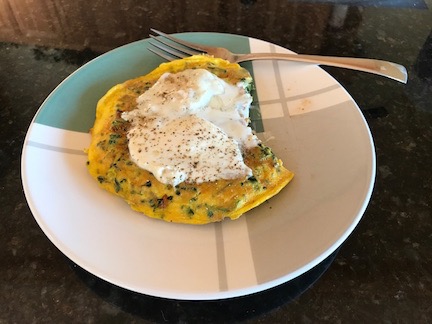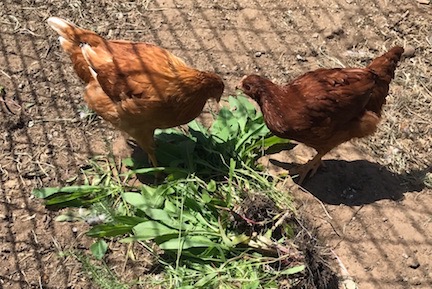Gardening, foraging, gleaning, making things from scratch.

This morning’s breakast: a frittata with home grown onions and broccoli, homemade cheese, and eggs from my neighbor’s chickens.
This morning, for breakfast, I had a frittata I made with onions and broccoli from my garden, eggs from my neighbor’s chickens, and Chaource cheese I made myself three weeks ago. (The only reason the eggs came from neighbors is because my 17 chickens aren’t laying yet.) I could have added chanterelle or gypsy mushrooms I foraged for and froze last autumn or morel mushrooms I forged for on Friday. (That would have been a waste of the morels.) Or I could have made blueberry muffins from scratch, using blueberries I picked and froze last summer and sweetened with honey from my bees. Or a smoothie made with those same blueberries, two strawberries from my garden (only two are ready right now), and yogurt I made myself.
It’s only recently that I’ve realized how much of my food comes from my own sources or resources. Last night, I made a batch of pickled broccoli stems with more of that garden broccoli and dill from my garden. The tomato sauce and pickled green beans I canned last winter are still forming the basis of pasta meals or snacks and hors d’oeuvres for dinner guests. The cherries I gleaned last summer are still in the fridge in the form of cherry chutney that goes very well with roast or grilled pork, turkey, or chicken. I’ve got five kinds of homemade cheese in various stages of ripening in my wine-fridge-turned-cheese-cave or refrigerator. I’ve got mead made from honey from my bees fermenting in my pantry closet. In my garden, the broccoli and onions are ready for harvest and I pick them right before I eat them. Soon I’ll also have tomatoes, peppers, green beans, brussels sprouts, cucumbers, corn, melons, zucchini, and potatoes, not to mention marion berries, ligon berries, and black-capped raspberries. And it I get back into the forest for a hike at just the right time, I can pick thimbleberries right off the bushes.

My chickens love to eat weeds. They’ll be making eggs in about 2-3 months.
I’ve discovered that I can turn weeds into eggs by feeding them to chickens and coffee filters into vegetables by composting them into a rich garden soil.
I spent literally hours traipsing through forest floors tangled with the debris of fires a year or more ago, looking for the morel mushrooms only found this time of year. Although I found a few — enough for a small side dish or pizza topping — I was competing with people who had a lot more experience than me and consider myself lucky to find ones they obviously missed.
It also takes a long time and makes a big kitchen mess to make cheese from scratch.
And gleaning cherries after harvest? Do you know how frustrating it is to see a perfect one just out of reach up in a tree and not be able to close your fingers around its stem?
Which is why people ask me why I bother. Why not just go to the supermarket and buy whatever’s there?
The only thing I can come up with is the feeling of satisfaction I get from knowing where my food comes from or what’s in it, and having a very active role in obtaining it, putting it on the table, and serving it to my guests.
Foraging for mushrooms, which I hope to blog about later in the week, is especially rewarding. When I say I spent hours searching, I’m not exaggerating. I went out into three different forest areas on four different days and came back with just five mushrooms, one of which is tiny. Yet the excitement I felt when I saw the biggest one cannot be overstated.
There’s something about having this closer connection to my food that I really like.
Next spring’s challenge: tracking down the wild asparagus that supposedly grows in the Chelan area.
What do you think? How involved are you in obtaining and preparing the food you eat?

Wow I think that is great. Really commendable I wish , I had the umph and motivation that you do. One question: Aren’t you supposed to leave some mushrooms to propagate the following years batch?
Mushrooms grow from below. They are the “fruiting bodies” of the fungus. I always cut and leave the roots behind. A lot of folks (including me) use mesh bags so some spores are released as they pick. I’m sure we don’t get them all. The group I belong to is very responsible; I haven’t heard anyone talk of leaving mushrooms behind. So I’m thinking the answer to your question is no.
That frittata looks yummy.
You have plenty of land, we are in a rural area but we operate a slightly different system. Our home plot is planned as lawn, decorative beds and trees. Vegetable gardening on the ‘home’ plot is quite rare here as home gardening is more of a competitive art form. Other parts of the UK are much less into this aesthetic.
But we have a wonderful system called ‘Allotments’. Half a mile from our home we rent a small patch of valley land for $17 per year to grow our vegetables. The plot is about 20×40 yards. We have a shed for tools and a small greenhouse.
This tiny space makes us self sufficient for potatoes, spinach, broccoli, onions, garlic, beans, strawberries, blackberries, rhubarb, tomatoes, squash, chives, sage, cale and asparagus (in season).
We would like chickens but the rules don’t allow them.
There are plenty of excellent mushrooms in the forest nearby.
Many of our meals are entirely home-grown, meat excepted. We give most of our squash and courgettes to friends.
The other allotment holders are great characters and we share much of what we grow.
This sounds wonderful!
Wow, what fun you are having! In the late 60s in Washington I began wanting to know how the pioneers made soap from ashes and lye, spun wool, wove fabric, fermented mincemeat (I used hamburger but successfully left out the suet), canned and did without. That was the time of “The Mother Earth Catalog”. So I bought a spinning wheel, 2 looms, a canner, a dryer (I know you would have built your own) and my son built a cast-iron smoker. I was never a successful gardener but gathered everything I could get my hands on, dried fruit, smoked fish, raised rabbits for food and banty hens as bug eaters. It was really a great feeling to master those skills. Every season I picked wild blackberries, huckleberries (on Mt. St. Helens and Adams) and did grow raspberries and fruit trees. For a few years there is seemed every time fruit ripened I was pregnant. You are correct, it is a great satisfaction to admire all those lovely jars of canned peaches, pears, beans, apples, plums, potatoes, berries and stews. One year in Arizona Lee helped me process olives but that was such a long procedure we did not do it again. But good for you, I never made cheese nor helped Lee much with the bee hives. You are amazing!!
It sounds like you did some really cool things. It’s great to go into the pantry and pull down a jar of something you made. Or give someone a jar of something neat as a gift.
I also have a dehydrator and have successfully dried fruit, tomatoes, and carrots. I have decided to downsize my apiaryand will selling off most of my bees. Two hives is enough. I have six now.
Sharon,
I read your comments in awe and admiration. You really know how to survive independently.
In earlier times you would have coped easily on the Lewis and Clark (1804-1806) westward expedition.
Respect.